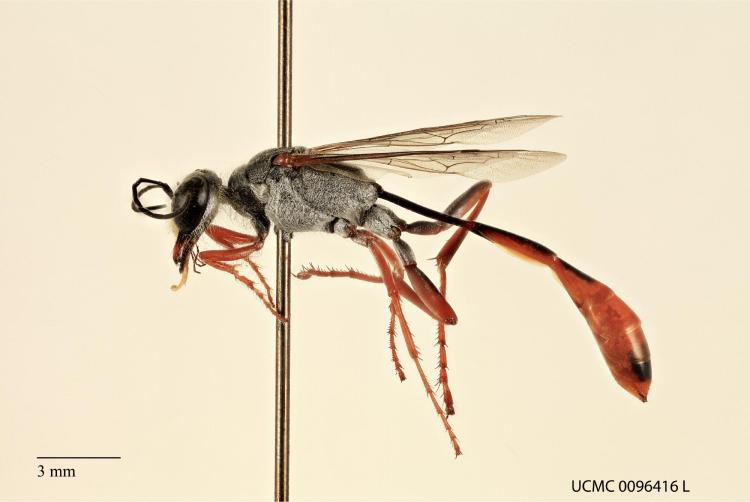The CU Museum is closed. We will be reopening soon.
During this time, collection visits will be available by appointment and other special access requests will be considered on a case-by-case basis.
Please email cumuseum@colorado.edu for more information.
Sand Wasp
Ammophila, also known as Thread-Waisted Sand Wasps, is a genus of medium-sized wasps that exhibit peculiar sand-nesting behavior. Like many solitary wasps, Ammophila dig nests with individual cells in which to oviposit their eggs. What is unique about this genus is that egg-laying females are markedly good mothers, provisioning their sand-dug nesting cells with live caterpillars. Some species drop individual caterpillars into each of these cells and oviposit a single egg on the side of each caterpillar, providing enough food to feed her hungry larva as it develops. Other species of Ammophila continually provision, hunting down live caterpillars and delivering them to their young as they develop.

One characteristic of Thread-Waisted Sand Wasps that has baffled scientists is the use of pebbles as tools to close off their nesting cells. Some early scientists believed this could be a sign of higher intelligence in Ammophila compared to other arthropods, but nowadays it is pretty well-accepted that these wasps aren’t Einstein Hymenopterans, just halfway decent mothers. In this particular image you can see yellow pollen stuck to the facial hairs of this Ammophila pruinosa, emphasizing the role of wasps as crucial pollinators and not just angry stingers. As a matter of fact, early account of this genus made special note of how focused and uneasily females are spooked during nest building, unlike some of the more commonly known territorial and aggressive wasps like Yellowjackets.

